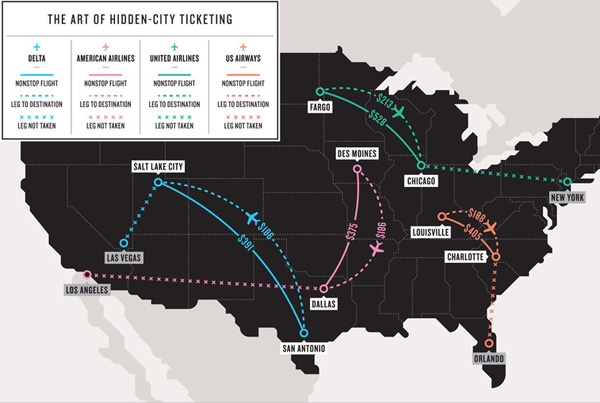Excellent use of a map
I spend a lot of time explaining which uses of maps are bad. In this case, the use of a map is spot-on. Nothing could better display this information than a map. So here’s what you are seeing. Due to the mechanism that determines flight pricing, some non-stop flights from City A to City B are cheaper than multi-leg flights that take passengers from City A to City C with a layover in City B. Figuring out where these curiously expensive cities are and then booking tickets through them (instead of to them) is called hidden-city ticketing. It’s technically forbidden by the airlines because it messes up their profit-making abilities, more on that later.
There are some markets – Atlanta, Cleveland, Salt Lake City, Charlotte, Detroit, Cincinnati or Chicago O’Hare – where prices are too high compared to the rest of the airfare market. If you want the longer version of why this is true, there is an excellent, lengthy, FiveThirtyEight/Nate Silver blog post, Which Airports Have the Most Unfair Fares?, on the vagaries of airfare pricing. Suffice it to say, if you happen to need to fly into one of these expensive cities, especially if you do it often, you are interested in figuring out how to avoid feeling like you are getting ripped off.
As a visual representation of this simple-but-hard-to-explain Point A to Point C via Point B scenario, a map is the best way to clarify the concept. Just look at how the visual works. A person starts in Fargo and wants to get to Chicago. If they crank that request through kayak, they end up with a direct flight to Chicago for $586 [ouch]. But if, instead, they tell kayak that they want to go from Fargo to New York with a layover in Chicago they end up paying only $213. Kayak let’s you tell it where you’d like to have a layover. (Detroit’s airport is surprisingly nice, for instance, and if I have to layover in the summer, I’ll go through Detroit.)
How can airlines charge less to fly a person a greater distance? Not all airline pricing is driven by fuel, snacks, and human capital costs. A good bit of it is driven by demand and supply – the classic economics story from your undergrad days. Some markets are not well served creating mini-monopolies for service in and out of those airports. Other markets, like New York, have a great deal of service provision forcing airlines to pull their prices into a lower, more competitive range.
Is it legal?
Perhaps you have read somewhere in your ticket’s fine print that the airline prohibits you from bailing out of your scheduled travel halfway through the trip. The New York Times asked a lawyer whether or not it’s even legal for the airlines to penalize people this way and how far they can go to punish someone caught doing this. It turns out, there are penalties the airlines can impose, but most of them can be side-stepped by savvy travelers. The Times presented recommendations, summarized here:
Making a habit of this certainly won’t endear you to the airlines. Most of them — the major exception being free-spirited Southwest Airlines — expressly forbid it in their ticketing rules. But those rules don’t carry the force of law, and most travel lawyers say that their recourse is limited. They could probably preclude you from flying with them in the future, but their case for demanding penalties is weak, and the risk of detection is low if you don’t book these kinds of routes more often than a couple of times per carrier per year.
Also, do not end up checking bags. They will end up at your final destination. Get to the gate early enough to ensure yourself space in the overhead bins.
Book your itinerary as two one-way flights. This should be logically obvious. If you are going from Fargo to Chicago but you book your ticket through to New York, you clearly won’t be wanting a return flight from New York because you never intended to actually see the Big Apple in the first place. The other kicker is that if you fail to report for part of your ticket, the airline will probably cancel whatever remains on the ticket. So book one-ways.
Don’t lie if the airlines catch you; lying increases your likelihood of being found guilty of fraud. Honesty is the best policy.
References
Silver, Nate. (6 April 2011) Which Airports Have the Most Unfair Fares? [blog post] The New York Times, FiveThirtyEight blog.
Silver, Nate. (4 May 2011) How to beat high airfares. Sunday Times Magazine. [Graphic The Art of Hidden-City Ticketing]

